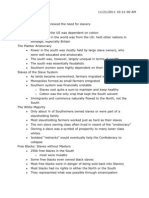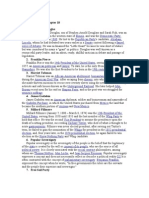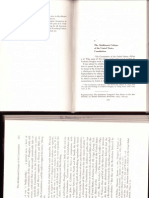Chapter #16: The South and The Slavery Controversy - Big Picture Themes
Chapter #16: The South and The Slavery Controversy - Big Picture Themes
Uploaded by
api-238484074Copyright:
Available Formats
Chapter #16: The South and The Slavery Controversy - Big Picture Themes
Chapter #16: The South and The Slavery Controversy - Big Picture Themes
Uploaded by
api-238484074Original Title
Copyright
Available Formats
Share this document
Did you find this document useful?
Is this content inappropriate?
Copyright:
Available Formats
Chapter #16: The South and The Slavery Controversy - Big Picture Themes
Chapter #16: The South and The Slavery Controversy - Big Picture Themes
Uploaded by
api-238484074Copyright:
Available Formats
Chapter #16: The South and the Slavery Controversy Big Picture Themes 1.
. Cotton ran the South before the Civil War it was "King Cotton." The entire southern economy was based on cotton. 2. The South had develo ed a yramid!li"e social structure. #rom to !to!bottom$ lanter aristocrats% small farmers% the white ma&ority 'who owned no slaves(% free blac"s% slaves. ). *ife as a slave could be wildly variedsome slave owners were "ind toward their slaves% some were immensely cruel. +n all situations% slaves were not free to do as they leased. ,. -bolition 'move to abolish slavery( began with the .ua"ers. #rederic" /ouglass became the main s o"esman against slavery. -nd William *loyd 0arrison rinted "The *iberator"% a radical abolition news a er. 1. Southerners countered that northern wor"ers were treated even worse than slaves. Slave owners% they said% had a vested interest in their slaves. 2orthern factory wor"ers e3 loited then fired their wor"ers. ID !TI"IC#TI$!S: 2at Turner lead a grou of rebels that slaughtered whites from lantation to lantation4 was caught and hanged eventually4 resulted in legal codes against -frican -merican education% rules% and regulation So&ourner Truth 5nited States rotestor and feminist who was freed from slavery and became an im ortant su orter of the ending of slavery and for women6s rights '1787!199)( Theodore /wight Weld -bolitionist who is best "nown for his co!authorshi of the authoritative com endium% -merican Slavery -s +t +s$ Testimony of a Thousand Witnesses% ublished in 19)8. :arriet ;eecher Stowe artly based 5ncle Tom<s Cabin on Weld<s wor" :arriet ;eecher Stowe - nineteenth!century -merican author mast well!"nown for 5ncle Tom<s Cabin% a owerful novel that incited eo le6s emotion against slavery. William *loyd 0arrison -n abolitionist of the nineteenth century% in his news a er% The *iberator% he demanded freedom from slavery for slaves and for the termination of all olitical ties between the northern and southern states.
/avid Wal"er :e was an -frican -merican activist who called for the ending of slavery in the new nation. :e was a leader within the ;lac" enclave in ;oston% =assachusetts% and he ublished in his - eal to the Colored Citi>ens of the World$ a call to "awa"en my brethren" to the ower within ;lac" unity and struggle.
%&ID D ' #DI!% (& STI$!S: )Cotton is *ing+) Know$ ?li Whitney% Cotton 0in 1. What is meant by "Cotton is King@" :ow did its sovereignty e3tend beyond the South@ What im lications did its rule have@ Cotton dominated economy in the south. ?li Whitney6s invention of the Cotton 0in increased slavery. The cotton from the south was to be sent to the 2orth for the roduction of te3tiles% which ?uro e was a large consumer of. The Planter )#ristocracy) Know$ Chivalry 2. +n what ways was the south "basically undemocratic@" The South was Abasically undemocraticB because it was influence heavily by lanter aristocracy4 a certain% s ecific grou of families maintained the olitical and social leadershi 4 the lanter aristocrats reveled in a large sta"e of southern wealth% their children could be educated in some of the finest schools and their money accommodated the leisure for schoolwor"% thin"ing% and di lomacy4 this ty e of governing furthered the ga between the rich and the oor and laid ta3!su orted ublic education to rest because the children of rich lanters could be sent to rivate institutions Slaves and the Slave System Know$ Cne cro economy ). What were the wea"nesses of the South<s de endence on cotton@ The South6s de endence on a one!cro economy was dangerous because the rice! level and value of cotton all de ended on world conditions. There wasn6t a healthy diversity of agricultural roducts in the South. The ,hite -a.ority Know$ Deoman #armer% hillbilly ,. Why did many whites who did not own slaves su ort slavery@ These whites% also "nown as Ahillbillies%B su orted slavery because it was their dream to one day own slaves and have their own small fortune. +t was a art of the A-merican /reamB of u ward social mobility. They feared% too% that if slaves were freed%
their racial su eriority would be watered down and diminished. "ree Blac/s: Slaves ,ithout -asters Know$ ?manci ate% mulattoes 1. Would it have been better to be a free ;lac" in the 2orth or in the South@ ?3 lain. +t would have been better being a free blac" in the 2orth because% even though there was still a large amount of re&udice in the 2orth% being a free blac" in the south would lead su orters of slavery to believe you were a su orter of emanci ation% leading them to discriminate you even more. +n the south% even free blac"s could own slaves as well% resulting in mulatto communities. Plantation Slavery Know$ Chattel% natural increase% :arriet ;eecher Stowe E. "... lanters regarded slaves as investments Fli"e a muleG...." ?3 lain what was ositive and what was negative about this situation for slaves. Hlanters invested a large amount of their money into their slave% so they would treat the slaves so that they would get their money6s worth. This desire of lanters to get Atheir money6s worthB was not that good because that would mean wor"ing more so the lanters would get more out of it. :arriet ;eecher Stowe showed the world that the life of a slave was li"e% in her boo" Uncle Toms Cabin.
0i1e &nder the 0ash Know$ Cverseer% brea"er% Cld South% /ee South 7. 0ive evidence to show that slaves develo ed a se arate% uniIue culture. What circumstances made this ossible@ Slaves were treated much differently than the Aaverage man%B so they were forced to live and grow u in different conditions. They had no olitical or civil rights whatsoever and were at the mercy of the white overseer% or blac" Adriver.B There were some laws rotecting the rights of slaves% but these were difficult to enforce as slaves were not allowed to testify in court. Jebellious slaves% also called Abrea"ers%B were flogged more often and much more harshly. +n the Cld South% the general slave was not as hard as that of the /ee South% as the old was more settled.
The Burdens o1 Bondage
Know$ Heculiar institution% 0abriel Hrosser% /enmar" Kesey% 2at Turner 9. Thomas Lefferson once said that having slaves was li"e holding a wolf by the ears% you didn<t li"e it but you couldn<t let go. :ow does this section hel to e3 lain this statement@ What Lefferson is trying to say is that eo le did want to free slaves and give them more rights% but they were afraid that in doing so% the freed slaves would begin a rebellion. With eculiar institution% slaves would wor" &ust the bare minimum reIuired so that they wouldn6t get lashed. There were also a few rebellions% such as the ones led by 0abriel Hrosser% /enmar" Kesey% and 2at Turner% but they were not successful. arly #2olitionism Know$ -bolition% The -merican Coloni>ation Society% Theodore Weld% -rthur and *ewis Ta an% :arriet ;eecher Stowe 8. /escribe some of the early abolitionists. ;ecause so many loathed blac"s% many early abolitionists focused on sending them bac" to -frica. The -merican Coloni>ation Society was founded for that ur ose. Theodore Weld% along with -rthur and *ewis Ta an% used their education to a eal to the ublic and reach their abolitionist ideals. Weld6s American Slavery as It Is heavily influenced :arriet ;eecher Stowe and her Uncle Toms Cabin. 'adical #2olitionism Know$ William *loyd 0arrison% Wendell Hhilli s% /avid Wal"er% So&ourner Truth% #rederic" /ouglass 1M. :ow were the attitudes of William *loyd 0arrison and #rederic" /ouglass different@ When dealing with an issue that is moral and olitical% how rigid should a erson be@ William *loyd 0arrison focused mostly on writing to resent his ideas while #rederic" /ouglass mostly resented his ideals orally. 0arrison seemed to be more interested in his own morality than slavery itself. /ouglass often loo"ed to olitics to end slavery. ;lac" abolitionists layed a very large role as well% including /avid Wal"er and So&ourner Truth. The South 0ashes Bac/ 11. :ow did the South defend itself against the attac"s of abolitionists@ +n the South% roslavery whites tried to use reason to su ort slavery% li"e saying it was su orted by the bible% and that the master!slave relationshi s resembled relationshi s in a family. They sent etitions to congress% while abolitionists did the same% endangering free s eech.
The #2olitionist Impact in the !orth
12.
:ow did 2ortherners view abolitionists@ /id they have any success@
-bolitionists were un o ular in the 2orth. 2ortherners were brought u to believe that slavery was a lasting bargain. =any abolitionists rovo"ed mob outbursts in the 2orth. ;ecause of these rebellions and outbursts% the 2orth began to see the South as unfree and hateful.
Chapter #13: -ani1est Destiny and Its 0egacy Big Picture Themes 1. - boundary dis ute with ?ngland over =aine was settled eacably. +n the long run% the 5.S. li"ely got the better end of the deal. 2. Te3as finally &oined the 5.S. Since the Te3as revolution% it6d been hanging in the balance. -merican lawma"ers finally decided it was too good of a ri>e to let sli by% so it was anne3ed in 19,1 ). Cregon was ne3t on the list of lands to seal u . +t was shared land% mainly between the 5.S. and ?ngland. -fter some negotiating over the border% the ,8th arallel was agreed u on. -gain% the 5.S. li"ely got the better. ,. The election of 19,, saw Lames K. Hol" run on a =anifest /estiny latform. -mericans li"ed the idea% voted him in% and he went after California. 1. When the =e3ican!-merican war was over% the ri>e of California that Hol" had wanted% was obtained. So was all of the modern -merican Southwest.
ID !TI"IC#TI$!S: Lohn Tyler Too" office after the death of William :enry :arrison in 19,1. :e was democratic% but the Whig arty influenced him. :e gave ermission to end the inde endent treasury% but he did not give ermission to create a #iscal ;an". :e was "nown as A:is -ccidencyB and an A?3ecutive -ss.B Slidell6s =ission Hreceding the =e3ican -merican war% resident Hol" sent Lohn Slidell to =e3ico to convey an arrangement saying that the Jio 0rande Jiver Te3as6s southern border. Slidell was told to offer )M million for California. =e3ico denied Slidell<s ro osals and declared war on =ay 1) 19,E. Lohn C. #remont :e was the first candidate of the Je ublican Harty for the office of resident of the 5S. :e was the first candidate to o ose slavery and was the governor of California. :e was also an -merican military officer and e3 lorer. =anifest /estiny The 5S was destined to secure the territory that would become all of -merica. +t drove territorial e3 ansion.
Lames K. Hol" Hresident of the 5S from 19,1!19,8. Won over :enry Clay in 19,,. Hromised to anne3 Te3as and led the Lac"sonian /emocracy. #oreign olicy s lit ownershi of Cregon wN ?ngland. When =e3ico re&ected -nne3ation of Te3as it led the 5S to victory in =e3ican -merican war which =e3ican cession then followed. Served for one term and did not run for reelection. Webster!-shburton Treaty Treaty determining border dis utes between 5S and ;ritish 2orth -merican Colonies. - disagreement over =aine!2ew ;runswic" resolved old border confusions. Signed by /aniel Webster and ;aron -shburton S ot Jesolution Hro osed in :ouse of Je resentative by -braham *incoln when he as"ed Hol" to give congress the e3act location of "the s ot" where blood was s ilt on -merican soil% as Hol" had said in 19,E when he as"ed congress to declare war on =e3ico The Tariff of 19,2 )2O ta3 on dutiable goods. Tyler was not fond of was needed rotective tariffs but the revenue
Treaty of 0uadalu e :idalgo #ebruary 2 19,9. The treaty between Hol" and the new =e3ican government for =e3ico to surrender California and 2ew =e3ico to the 5S and recogni>e the Jio 0rande as the southern border of Te3as. +n return% the 5S romised to underta"e any financial claims its citi>ens had against =e3ico and to ay =e3ico P11 million Wilmot Hroviso /isagreement over =e3ican territory that -merica won during the =e3ican War becoming free or slave territory. /avid Wilmot ro osed an amendment declaring that any territory acIuired from =e3ico would be free. This amendment was a roved by the :ouse twice% but failed to be a roved in Senate. The "Wilmot HrovisoB became a re resentation of how e3treme disagreement over slavery in the 5S was.
You might also like
- 2021 March Sat Qas Full PDF With AnswersDocument65 pages2021 March Sat Qas Full PDF With AnswersCeline EdelbyNo ratings yet
- Women's History: Women's Role in Colonial SocietyDocument40 pagesWomen's History: Women's Role in Colonial Societyblakedinga43967% (3)
- Paper History2 1Document5 pagesPaper History2 1api-548096274No ratings yet
- ArntiwomanDocument16 pagesArntiwomanRyan T Dunn100% (1)
- 13th Ammendment - Us History Lesson Plan RuizDocument4 pages13th Ammendment - Us History Lesson Plan Ruizapi-233660821No ratings yet
- CH 16-17 ApushDocument8 pagesCH 16-17 Apushapi-236312482No ratings yet
- Chapter 16 - The South and The Slavery Controversy: I. "Cotton's Is King!"Document26 pagesChapter 16 - The South and The Slavery Controversy: I. "Cotton's Is King!"TautsuNo ratings yet
- Chapter 16 - 17 IdsDocument6 pagesChapter 16 - 17 Idsapi-236208248No ratings yet
- Final Old Soth Paper Hist 4505Document11 pagesFinal Old Soth Paper Hist 4505api-330206944No ratings yet
- Apush Chapter 16-17 Study GuideDocument8 pagesApush Chapter 16-17 Study Guideapi-236296135No ratings yet
- Chapter 16-17Document9 pagesChapter 16-17api-235651608No ratings yet
- 09 SlaveryDocument16 pages09 SlaverymonicaNo ratings yet
- Chapter 18Document5 pagesChapter 18api-235663646No ratings yet
- ch18-19 SGDocument8 pagesch18-19 SGapi-235562839No ratings yet
- Road to Civil War Timeline CopyDocument31 pagesRoad to Civil War Timeline Copygilease1No ratings yet
- CH 18-19 ApushDocument13 pagesCH 18-19 Apushapi-238484074No ratings yet
- Paper History2 1Document5 pagesPaper History2 1api-548096274No ratings yet
- Slavery and race in america versus the rest of the world (1)Document4 pagesSlavery and race in america versus the rest of the world (1)comitodanNo ratings yet
- History Sba - SlaveryDocument14 pagesHistory Sba - SlaveryKarlene ElliottNo ratings yet
- The Underground Railroad: A Captivating Guide to the Network of Routes, Places, and People in the United States That Helped Free African Americans during the Nineteenth CenturyFrom EverandThe Underground Railroad: A Captivating Guide to the Network of Routes, Places, and People in the United States That Helped Free African Americans during the Nineteenth CenturyNo ratings yet
- Dav92693 ch08 171-202Document32 pagesDav92693 ch08 171-202Solorio45No ratings yet
- Thesis Statement About Slavery in AmericaDocument5 pagesThesis Statement About Slavery in AmericaWriteMyPaperForMeTucson100% (3)
- ENGL405 1.2.4 The Ante Bellum South Life On A PlantationDocument16 pagesENGL405 1.2.4 The Ante Bellum South Life On A PlantationNIRMALYA NANDINo ratings yet
- Bailey 16Document5 pagesBailey 16jpepperman95No ratings yet
- (Section4) The Case For Reparations by Ta-Nehisi Coates - The AtlanticDocument3 pages(Section4) The Case For Reparations by Ta-Nehisi Coates - The AtlanticLynne AshmarNo ratings yet
- A Primary Source History of Slavery in the United StatesFrom EverandA Primary Source History of Slavery in the United StatesNo ratings yet
- Apushch 1617 IdDocument8 pagesApushch 1617 Idapi-235757939No ratings yet
- The Battle over Slavery: Causes and Effects of the U.S. Civil WarFrom EverandThe Battle over Slavery: Causes and Effects of the U.S. Civil WarNo ratings yet
- Nass Notes - History Module1Document42 pagesNass Notes - History Module1Joel Gwenere100% (12)
- 12 Million Black VoicesDocument3 pages12 Million Black VoicesIAMAUGUSTINENo ratings yet
- Good Slavery ThesisDocument7 pagesGood Slavery ThesisBuyCheapPapersMiramar100% (2)
- Sectional ConflctDocument7 pagesSectional ConflctJorge ParkerNo ratings yet
- Colonization of The AmericasDocument4 pagesColonization of The Americasapi-427038508No ratings yet
- Lesson 20 African Americans in The Mid 1800sDocument40 pagesLesson 20 African Americans in The Mid 1800sfishertr1No ratings yet
- 3.1 - Lowcountry Vs UpcountryDocument5 pages3.1 - Lowcountry Vs UpcountryMegan ReillyNo ratings yet
- Colonialism in The BahamasDocument8 pagesColonialism in The BahamasjosephwambuinjorogeNo ratings yet
- A Nation Divided - The Issue of SlaveryDocument4 pagesA Nation Divided - The Issue of SlaveryLau RamirezNo ratings yet
- Lesson 22 Slave Culture and The Old South Step ThreeDocument37 pagesLesson 22 Slave Culture and The Old South Step ThreeGabriel Balderrama100% (1)
- Inconvenient FactsDocument2 pagesInconvenient FactsCharles HancinNo ratings yet
- Lesson 21 Slavery in America, The "Peculiar Institution" StudentDocument25 pagesLesson 21 Slavery in America, The "Peculiar Institution" StudentGabriel Balderrama100% (1)
- Sketches in the History of the Underground Railroad: Comprising Many Thrilling Incidents of the Escape of Fugitives from Slavery, and the Perils of Those who Aided ThemFrom EverandSketches in the History of the Underground Railroad: Comprising Many Thrilling Incidents of the Escape of Fugitives from Slavery, and the Perils of Those who Aided ThemNo ratings yet
- Black Slaveowners - Larry Koger (1985)Document534 pagesBlack Slaveowners - Larry Koger (1985)csellesmNo ratings yet
- European SlavesDocument7 pagesEuropean Slavestalub999100% (1)
- UntitledDocument8 pagesUntitledCHAELYN SINGHNo ratings yet
- Week 2 - B - American Slavery & King CottonDocument8 pagesWeek 2 - B - American Slavery & King CottonwanglovedjmaxNo ratings yet
- Escape on the Pearl: The Heroic Bid for Freedom on the Underground RailroadFrom EverandEscape on the Pearl: The Heroic Bid for Freedom on the Underground RailroadRating: 4 out of 5 stars4/5 (9)
- Of Mice and Men Revision GuideDocument21 pagesOf Mice and Men Revision Guidemottainai.handsontokyoNo ratings yet
- Slave Culture and ResistanceDocument8 pagesSlave Culture and Resistanceharshitakandpal1234No ratings yet
- The Rush for Black Diamonds, Volume One: From John Locke to Thomas Jefferson—The Transatlantic Slave Trade to Chattel Slavery in the UK and the USFrom EverandThe Rush for Black Diamonds, Volume One: From John Locke to Thomas Jefferson—The Transatlantic Slave Trade to Chattel Slavery in the UK and the USNo ratings yet
- The 6 Killer Apps of ProsperityDocument10 pagesThe 6 Killer Apps of ProsperitySchezad AfrįdįNo ratings yet
- Rpt1-Methods of Slave SuppressionDocument1 pageRpt1-Methods of Slave Suppressiontranthamngoc2003No ratings yet
- The American People, 6Document3 pagesThe American People, 6api-25933731No ratings yet
- Chapter 16-17 Study GuideDocument5 pagesChapter 16-17 Study Guideapi-235851604No ratings yet
- Regents Packet 12 15 13Document31 pagesRegents Packet 12 15 13api-214573696No ratings yet
- Barbarous Mexico: An Indictment of a Cruel and Corrupt SystemFrom EverandBarbarous Mexico: An Indictment of a Cruel and Corrupt SystemNo ratings yet
- America's Past: Marginalization By: Alexia BlakeDocument5 pagesAmerica's Past: Marginalization By: Alexia Blakeapi-405753732No ratings yet
- Position Paper - His 1101 6Document3 pagesPosition Paper - His 1101 6api-509657811No ratings yet
- CH 27 ApushDocument7 pagesCH 27 Apushapi-238484074No ratings yet
- Chapter #28: Progressivism and The Republican Roosevelt - Big Picture ThemesDocument11 pagesChapter #28: Progressivism and The Republican Roosevelt - Big Picture Themesapi-238484074No ratings yet
- Apsuh HSSH HellDocument29 pagesApsuh HSSH Hellapi-238484074No ratings yet
- CH 18-19 ApushDocument13 pagesCH 18-19 Apushapi-238484074No ratings yet
- ch11 12Document10 pagesch11 12api-238484074No ratings yet
- George LawrenceDocument17 pagesGeorge Lawrencejelang15No ratings yet
- Slavery - Abolition & Free Men of ColorDocument48 pagesSlavery - Abolition & Free Men of ColorThe 18th Century Material Culture Resource Center100% (3)
- Apush AssignmentsDocument10 pagesApush AssignmentsAlex SchmiraNo ratings yet
- عقدة الزنجي في الكتاب المقدس PDFDocument562 pagesعقدة الزنجي في الكتاب المقدس PDFNasserElhawyNo ratings yet
- English Test: Aprotrain - Aptech Computer Education Reading ComprehensionDocument7 pagesEnglish Test: Aprotrain - Aptech Computer Education Reading ComprehensionMai MitNo ratings yet
- William Grimes RunawayDocument9 pagesWilliam Grimes RunawaySalaam HaniyfNo ratings yet
- Edward Wilmot Blyden - The African Problem, and The Method of Its Solution (1890)Document30 pagesEdward Wilmot Blyden - The African Problem, and The Method of Its Solution (1890)chyoung100% (1)
- A LincolnDocument5 pagesA Lincolnapi-268505240100% (1)
- The Infernal Spirit of Slavery, Go Sound The Jubilee, Judgement Day and Legacy. Born IntoDocument5 pagesThe Infernal Spirit of Slavery, Go Sound The Jubilee, Judgement Day and Legacy. Born IntoELKANAH MATHAINo ratings yet
- DBQ #6Document2 pagesDBQ #6Maria ChavezNo ratings yet
- 1619 Reflection 1Document6 pages1619 Reflection 1api-554844732No ratings yet
- More Blacksmith StoriesDocument19 pagesMore Blacksmith Storiesapi-533231373No ratings yet
- Chapter 18Document3 pagesChapter 18Paul JonesNo ratings yet
- DuBois - The Talented Tenth PDFDocument23 pagesDuBois - The Talented Tenth PDFKatlego AkompeNo ratings yet
- Kate Chopin and Problems of Women in Her Works PDFDocument104 pagesKate Chopin and Problems of Women in Her Works PDFIsmailHasaniNo ratings yet
- Book Review: Free Soil, Free Men, Free Labor: The Ideology of The Republican Party Before The Civil WarDocument3 pagesBook Review: Free Soil, Free Men, Free Labor: The Ideology of The Republican Party Before The Civil WarWilliam R CoxNo ratings yet
- The Abolitionist Critique of The Constitution LyndDocument16 pagesThe Abolitionist Critique of The Constitution LyndAsanijNo ratings yet
- American Romanticism 1800-1855Document18 pagesAmerican Romanticism 1800-1855Jovito D. CabilisNo ratings yet
- Assignment For Session 4. Goethe Pushkin Douglass ENG 2206 Summer 2022Document4 pagesAssignment For Session 4. Goethe Pushkin Douglass ENG 2206 Summer 2022Ngọc Anh TrầnNo ratings yet
- Soal Reading TOEFL Free Download Kunci Inggris Dot ComDocument8 pagesSoal Reading TOEFL Free Download Kunci Inggris Dot ComJenry Reyes TrispaNo ratings yet
- Description of Site and Learners: Groves High Student DemographicsDocument23 pagesDescription of Site and Learners: Groves High Student DemographicsmediaspecialistNo ratings yet
- Chicago Defender PaperDocument28 pagesChicago Defender Paperfoster2452No ratings yet
- (Dezerega) - (Angelina and Sarah Grimké) ContextDocument2 pages(Dezerega) - (Angelina and Sarah Grimké) Context25asa.dezeregaNo ratings yet
- MLP 1Document4 pagesMLP 1api-603020113No ratings yet
- Good Thesis Statement For Frederick DouglassDocument5 pagesGood Thesis Statement For Frederick Douglassafjrtopab100% (2)
- Abraham Lincoln's Letter To His Son's TeacherDocument4 pagesAbraham Lincoln's Letter To His Son's TeacherHuỳnh KT HươngNo ratings yet
- Summary Sheet Civil WarDocument2 pagesSummary Sheet Civil Warapi-326680792No ratings yet





























































































